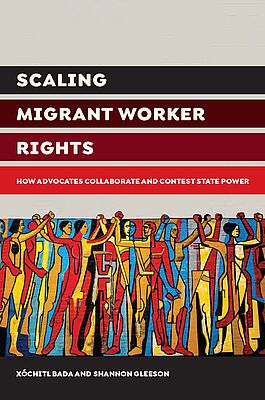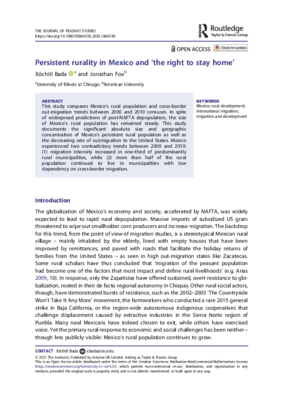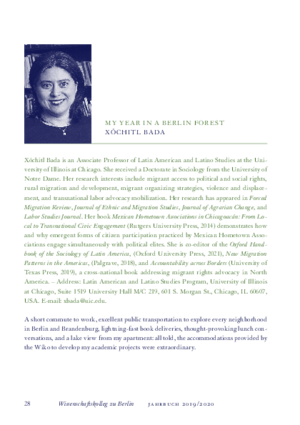
Xóchitl Bada, Ph.D.
Associate Professor of Latin American and Latino Studies
University of Illinois at Chicago
Born in 1972 in Veracruz, Mexico
Studied International Relations at the Universidad Nacional Autónoma de México, Political Science at The New School for Social Research, New York, Social Sciences at The University of Chicago, and Sociology at the University of Notre Dame
Project
Transnational Approaches to Immigrant Labor Rights Advocacy
As migrant populations across the globe continue to cross borders and immigrant communities become established with and without documentation, both origin and destination countries are now involved in managing immigrants. State and local governments frequently enact domestic laws expanding or contracting immigrant rights. Consequently, in the last 30 years, immigrant advocacy organizations have demanded protections in various areas, including employment, health, and education. The strategies these organizations employ transcend the geographical container of states as they push government bureaucracies to be accountable to the needs of these populations. The relationships these organizations establish on various government scales in the countries of origin and reception to challenge systems of governance are not well understood.Taking Mexico and the United States as entry points and using a comparative frame, this project addresses empirical case studies ranging from domestic labor rights enforcement practices to transnational labor advocacy. I analyze support and pressure tactics in transnational migrant civil society organizations and how these practices are constituted on different scales, ranging from the local to the transnational. The study design offers equal importance to government bureaucracies, subnational diplomacy, worker centers, labor unions, and other migrant-serving nonprofits. By focusing on the strategies that these organizations pursue to expand their influence across borders, I question the meaning of associating effective communicative power with civil society forums that do not necessarily correlate with sovereign states. I aim to identify challenges arising from transnational public spheres with distinctive institutional actors in labor rights arenas in which the interlocutors are not fellow members of a political community, but are constantly attempting to gain equal rights.
Recommended Reading
Bada, Xóchitl and Shannon Gleeson, eds. Accountability Across Borders: Migrant Rights in North America. Austin: University of Texas Press, 2019.
Feldmann, Andreas E., Xóchitl Bada, and Stephanie Schütze, eds. New Migration Patterns in the Americas: Challenges for the 21st Century. New York: Palgrave Macmillan, 2019.
de Graauw, Els, Shannon Gleeson and Xóchitl Bada. "Local Context and Labour-Community Immigrant Rights Coalitions: A Comparison of San Francisco, Chicago, and Houston." Journal of Ethnic and Migration Studies 28 January 2019. doi: 10.1080/1369183X.2018.1556454.
Colloquium, 26.11.2019
Workers' Rights Across Borders: Bringing the Sending State Back Into the Local
Low-wage migrant workers experience precarious employment and struggle to gain access to basic labor protections. This is especially true for the five percent of the foreign-born workforce in the United States that is unauthorized, despite the fact that labor standards offer the same basic employment rights to all workers, regardless of their legal residence status. Presently, unauthorized immigrant workers average fifteen years of continuous residence in the United States and are confined to precarious labor markets and occupations with weak - and sometimes non-existent - enforcement mechanisms. Factors contributing to this precariousness include a race to the bottom for labor costs in highly competitive sectors, a steep drop-off in unionization, and insufficient resources to enforce basic protections such as wage and hour, discrimination, and occupational health and safety standards. Most important, the constant fear of deportation prevents victims from reporting abuse to authorities. The reality is that many immigrant-dense industries - such as hospitality, caregiving, e-commerce logistics, agriculture, and construction sectors - are frequently dependent on low-wage and highly precarious migrant labor. Even temporary workers with work permits struggle to access workplace protections.
Over the past two decades, US immigration policy has seen the rise of two opposing forces. On the one hand, the United States has restricted immigrant rights. In response, on the other hand, a growing number of civil society watchdogs have advocated on behalf of low-wage migrant workers who are the most vulnerable to exploitation. In this struggle, instruments of global governance such as the UN International Convention on the Protection of the Rights of All Migrant Workers and Members of their Families (CMW) has been used to argue in favor of extending immigrant rights. The CMW, while nonbinding and pending ratification, has proven useful in influencing regional processes. For example, CMW has been influential in nonbinding regional processes such as NAFTA's labor side accords, contributing to the development and dissemination of new best practices concerning migrant labor rights in any trade negotiations.
In my colloquium, I will summarize the main pitfalls of the current system of US labor regulation and will share the empirical background of the book I am currently working on about the transnational governance of migrant rights on the meso-level. Taking Mexico and the United States as entry points, my research draws on empirical case studies ranging from domestic labor rights enforcement practices within the United States to transnational labor advocacy. The institutional focus is the local dynamics of transnationally produced labor rights co-enforcement. My goal is to analyze how organizations put tactical pressure on various government bureaucracies to defend migrant rights in Mexico and the United States. My book details the multiple strategies that transnational civil society organizations pursue to expand their influence across borders, spreading their message in discursive spaces that do not necessarily correlate with sovereign states. This analytical approach gives equal importance to all institutional actors, including government bureaucracies, subnational diplomacy, worker centers, labor unions, and other migrant-serving nonprofits. By focusing on the strategies that these organizations pursue to expand their influence across borders, the book will identify the challenges arising from a transnational public sphere in which the interlocutors are not all fellow rights-holding members of a political community.
Publications from the Fellow Library
Bada, Xóchitl ([Erscheinungsort nicht ermittelbar], 2023)
Scaling Migrant Worker Rights : How Advocates Collaborate and Contest State Power
Bada, Xóchitl (London, 2020)
Persistent rurality in Mexico and 'the right to stay home'
Bada, Xóchitl (Dordrecht [u.a.], 2019)
Institutionalizing a binational enforcement strategy for migrant worker rights
Bada, Xóchitl (Abingdon [u.a.], 2019)
Bada, Xóchitl (Cham, Switzerland, 2019)
New migration patterns in the Americas : challenges for the 21st century
Bada, Xóchitl (Austin, 2019)
Accountability across borders : migrant rights in North America
Bada, Xóchitl (2018)
Union organizing, advocacy, the services and the nexus of immigrant and labor rights
Bada, Xóchitl (Oxford, 2017)
Mexico’s Michoacán state : mixed migration flows and transnational links
Bada, Xóchitl (Zamora, Michoacán, 2017)
Asociaciones de oriundos mexicanos en "Chicagoacán" : del compromiso cívico local a la acción trasnacional Mexican hometown associations in Chicagoacán
Bada, Xóchitl (Urbana, Ill., 2017)
Immigration to the United States in the post-civil rights years


